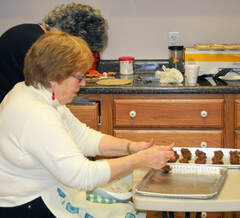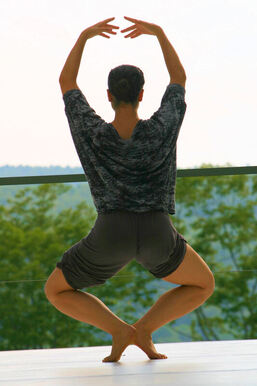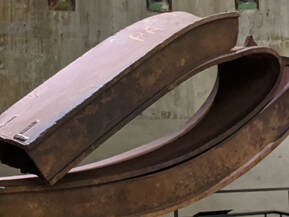 I grew up about as non-liturgical as possible. (Think Southern Baptist in Oklahoma.) So for a number of years, I thought of Easter as a single day. That's not to say the day wasn't special. My sister and I got new dresses and shoes. People we didn’t see any other time showed up for worship. There were extra flowers, and one of the women in the choir sang a special solo. But in many ways, Easter was a “one and done” for me during those years. There was no Eastertide or season of Easter. I can’t put an exact date on when that began to change. Maybe it was during the first time I lived in the Washington, D.C., area and was part of a more liturgical congregation. Maybe it was while I was in divinity school and began thinking about preaching throughout the church year. What I do know is that I’ve come to value Easter as a season rather than a single day. And perhaps I’ve never cherished that season more than this year as we’re facing such a challenging and uncertain time. As we entered the Easter season, I’ve been reflecting on some of the things I’ve experienced during this pandemic. Things that remind me of the possibility of new life and new beginnings—often in surprising ways and at unexpected times. Things that offer hope and joy, in large part, because of the connections they’ve provided with other people. I’ve come to think of these things as containing echoes of Easter. Echoes I hope to help carry forward in the months ahead.
0 Comments
 Have you ever noticed how in the Scriptures men are always going up into the mountains to commune with God? Yet in the Scriptures, we hardly ever hear of women going to the mountains. And we know why, right? Because the women were too busy keeping life going; they couldn’t abandon babies, meals, homes, fires, gardens, and a thousand responsibilities to make the climb into the mountains. I was complaining about this to a friend the other day, saying that even as a modern woman, I feel like I’m never “free” enough from my responsibilities, never in a quiet enough or holy enough spot to have the type of communion I want with God. Her response floored me. “That is why God comes to women. Men have to climb the mountain to meet God, but God comes to women wherever they are.” God does indeed come to women where they are, when they are doing their ordinary, everyday work. God meets them at the wells where they draw water for their families, in their homes, in their kitchens, in their gardens. God comes to them as they sit beside sickbeds, as they give birth, care for the elderly, and perform necessary mourning and burial rites. Even the women at the empty tomb, who were the first to witness Christ’s resurrection, were only there because they were doing the womanly chore of properly preparing Christ’s body for burial. In this seemingly mundane and ordinary task, these women found themselves face to face with divinity. So, if like me you ever start to bemoan the fact that you don’t have as much time to spend in the mountains with God as you would like, remember, God comes to women. God knows where we are and the burdens we carry. God sees us, and if we open our eyes and our hearts, we will see God, even in the most ordinary places and in the most ordinary things. Adapted from a blog post by Heather Farrell  The weeks leading up to Easter Sunday were different this year. For me, the difference had less to do with the liturgical season of Lent than the everyday impact of COVID 19. I’ve been home a lot more and learning to work in new ways. I’m trying to develop a new normal that will help me keep a better balance in my day-to-day life, That new normal includes paying closer attention to the small things. Instead of rushing through walks with my dog, Wilbur, I remind myself there’s no need to hurry home just so I can head out to the office or another commitment. I try to pay attention to the buds that appear on tree branches that were bare the day before. I try to listen to the increasing diversity of chirps and tweets and songs as birds return from their migratory journeys. I try to be grateful that Wilbur can join me on these walks since several months ago he couldn’t use his hind legs. I’ve also noticed other small things that have brought joy and hope. Some are gestures others have offered me, and some are things I’ve done but might have missed at other times. But each of them, in one way or another, has to do with connections. Over the next few weeks, I’ll share some of the small things I hope to continue even when the pandemic no longer defines daily life. For me these small things carry echoes of Easter—possibilities of new life and new beginnings that come when we might least expect them and that we often miss because we’re too busy to pay attention. For now, I invite you to notice at least one small thing today and embrace the joy or hope it offers. Maybe you’ll also hear an echo of Easter. KP  Easter can be a tricky day. We usually think of it as big and bright and even loud. There are stunning flowers, soaring music, sunlight streaming through the windows. We sing “Alleluia!” and hear words about resurrection and new life. But what do we do when we’re not feeling big and bright? When we come to Easter with hearts that are heavy, minds that are distracted, spirits that are troubled? What do we do when we’re unsure about what to make of Easter? Unsure because of what’s going on in the world around us. Unsure because of the anxiety and uncertainty within us. Maybe words from John’s gospel can help: Early on the first day of the week, while it was still dark. . . . It’s easy to miss how John’s account of the first Easter begins. Our minds automatically skip ahead to how we know things will end: with resurrection, belief, joy. But in the Fourth Gospel, the resurrection narrative begins while it's still dark. And it unfolds through a series of small steps, small discoveries that reveal a path out of that darkness.  Love expands. Fear contracts. Those two simple sentences stood out in an article I read several years ago. With only four words, they express a powerful message that’s remained with me. Love expands. Fear contracts. Perhaps more than any other time in my life, fear seems to run rampant in our world. Not only are people afraid of the physical danger of the coronavirus, but they also fear what the crisis may mean for them and others financially; how it may impact congregations, schools, and other institutions in the upcoming months; and what long-term consequences it may have. Fear does have its place. It is an emotion designed to alert us to possible danger. It causes our adrenalin to increase, which can make us more alert and able to deal with those dangerous situations. Fear, when dealt with properly, can energize us. But too often fear does the opposite. Instead of giving us energy, it causes us to contract. We pull into the confines we have constructed in an effort to protect ourselves. We circle the wagons in the hope that living in a small, tight manner will keep us safe. Love expands. Fear contracts. The Bible contains story after story of individuals who face significant moments of decision or transition and who hear a simple divine message: “Do not fear.” What often follows those words is a reminder of the power of love. For me, this is one of the central messages of Easter. The events of Holy Week and Easter morning reveal a God who displays great love. This love involves a willingness to be vulnerable and risk rejection; to care for others in a way that allows their fate to affect one’s own; and to give to others even when there is a real cost to oneself.  Love expands. Fear contracts. Those two simple sentences stood out in an article I read several years ago. With only four words, they express a powerful message that’s remained with me. Love expands. Fear contracts. Perhaps more than any other time in my life, fear seems to run rampant in our world. Not only are people afraid of the physical danger of the coronavirus, but they also fear what the crisis may mean for them and others financially; how it may impact congregations, schools, and other institutions in the upcoming months; and what long-term consequences it may have. Fear does have its place. It is an emotion designed to alert us to possible danger. It causes our adrenalin to increase, which can make us more alert and able to deal with those dangerous situations. Fear, when dealt with properly, can energize us. But too often fear does the opposite. Instead of giving us energy, it causes us to contract. We pull into the confines we have constructed in an effort to protect ourselves. We circle the wagons in the hope that living in a small, tight manner will keep us safe. Love expands. Fear contracts. |
Kathryn PalenAssociate Executive Minister Archives
January 2023
Categories |
 RSS Feed
RSS Feed